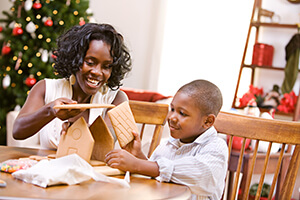Help children focus on the gift of presence at Christmas time
It sounds kind of grinchy to say so, but in an honest moment — most parents would admit that getting through the holidays is often an exercise in survival. Tensions can run high with increased demands, changes in routine, less sleep, more sugar and financial pressure. The holidays don’t have to be a time of misery — keep the magic with your children by considering these tips and suggestions.
- Be realistic. Accept that the holidays will not be perfect. A child’s age and temperament will impact what traditions and events may be enjoyable or more stress than they are worth. Decide with your partner what holiday activities and gatherings are especially meaningful and eliminate from your schedule those that cause stress and anxiety for you and the children.
- Plan ahead. Children thrive on routine and usually the holiday schedule is anything but normal. Recognize your children’s needs and do your best to meet them. If your child must nap, try to plan your events around the naptime. Or if travel is needed, drive during the child’s naptime if he or she sleeps well in a vehicle. Back-to-back activities for days is likely to be bring tantrums and misbehavior. Space events out so the family can recover and rest.
- Make your family’s health a priority. In the hustle and bustle, make sure you and your children eat a variety of fruits and vegetables, drink water, limit sweets, exercise and follow a regular sleep schedule. There will of course be exceptions, but try to return to healthy habits and routines as soon as possible and be prepared that children’s behavior isn’t likely to be at its best with a diet of cookies and late nights.
- Talk with children about situations that may arise. There always are teachable moments in everyday life and holiday gatherings are no exception. Think of possible scenarios that may arise or have been a problem in the past and ask your child how they would respond. For example, if they received a gift they didn’t like, a cousin took their new toy without asking or a relative asked for a hug and they weren’t comfortable giving one. If your child isn’t sure how to respond, coach them with what they can say or do. Preparing children ahead of time can help both of you avoid a possible awkward or tense time and give your child confidence in new or uncertain situations.
- Focus on time spent together, not presents. Can we be honest again? How many children really need another truck, doll or gadget? What children really need is their parents present and active in their lives. Set up a gift budget early and stick to it before you get wrapped up in the emotions of the season. Long after the new toys are discarded, children will remember simple memories made together, baking cookies, chatting over a cup of hot chocolate or snuggling while reading a favorite holiday book. Give the gift of you — your time, attention and unconditional love — all year-round.
Determine to enjoy the special moments with your family this season, even when they don’t look like a Hallmark card.
Happy holidays!
